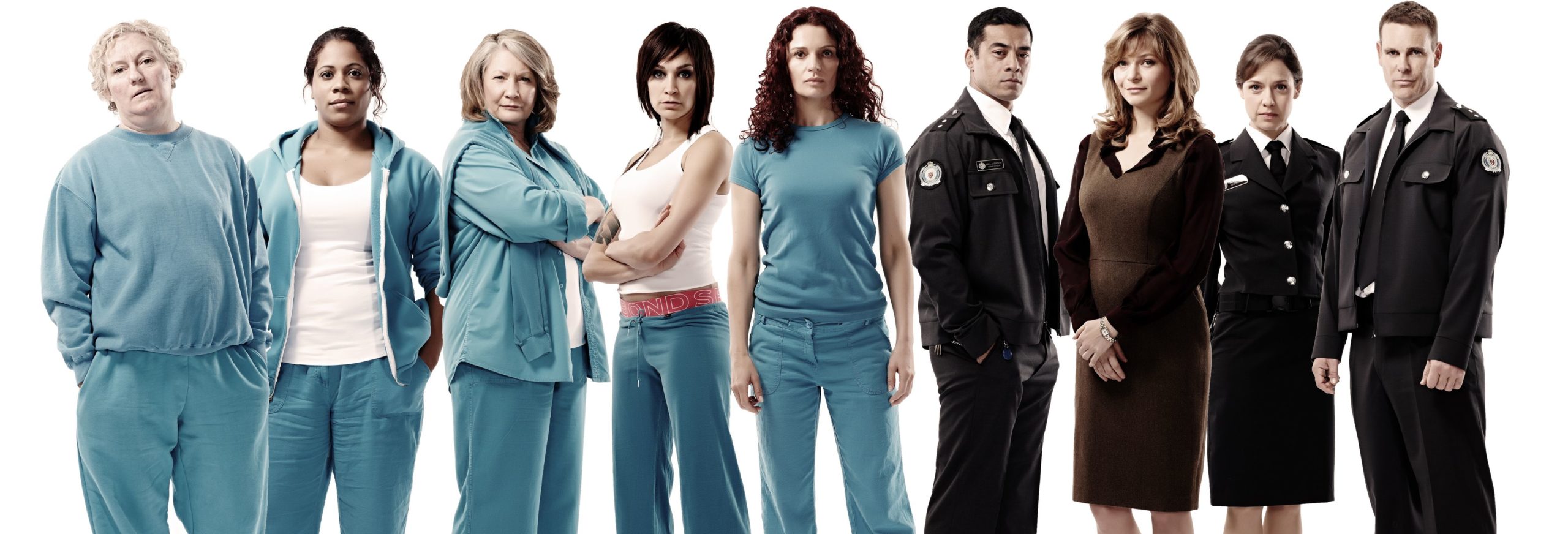 ★★★★
★★★★
“Sheilas behind bars.”
 Back in the eighties, there was an Australian women-in-prison soap opera called Prisoner Cell Block H. [It was called Prisoner on its home turf, but was renamed in the UK and US, to avoid confusion with The Prisoner] It ran for eight seasons, totalling 692 (!) episodes, and achieved a fair bit of cult status, mostly through late-night screenings on TV. Much of its reputation was based on “so bad it’s good” elements, such as the wobbly sets; a review calls it, “one of the most bizarre, violent, lesbian-fetishy-heart-warming dramas ever created.” The show concluded its run in 1986, but was never forgotten.
Back in the eighties, there was an Australian women-in-prison soap opera called Prisoner Cell Block H. [It was called Prisoner on its home turf, but was renamed in the UK and US, to avoid confusion with The Prisoner] It ran for eight seasons, totalling 692 (!) episodes, and achieved a fair bit of cult status, mostly through late-night screenings on TV. Much of its reputation was based on “so bad it’s good” elements, such as the wobbly sets; a review calls it, “one of the most bizarre, violent, lesbian-fetishy-heart-warming dramas ever created.” The show concluded its run in 1986, but was never forgotten.
More than 25 years later, the concept was rebooted in 2013 as Wentworth, and enjoyed a renaissance. While also running for eight seasons, rather than trash (not that there’s anything wrong with that, mind you!), this version proved to be remarkably well made. It likely helped that the remake’s production schedule here was rather less frantic, ending at exactly 100 episodes last October. The show is currently ranked by the IMDb in the top 250 TV series of all time, and was sold to over 90 countries, achieving a worldwide audience, thanks in part to its distribution on streaming services like Netflix and Amazon Prime.
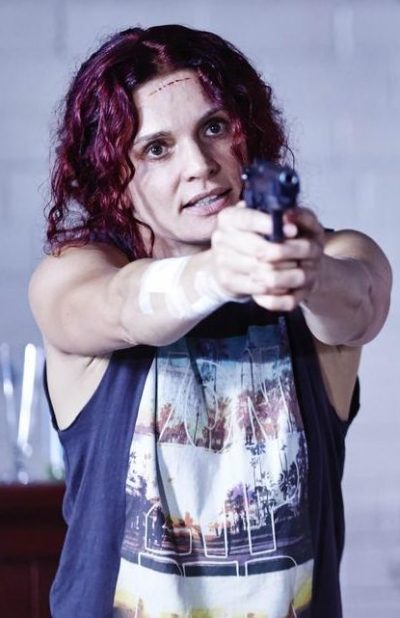 It spawned local remakes in a number of countries. The Dutch was the most successful, running for four seasons, but Belgium, Germany and Turkey also took the show and recreated it. [Here is as good a place as any to mention that back in 1982, there was a male spin-off of the original show called Punishment. Though it lasted only one season, the cast included some guy called Mel Gibson…] Indeed, the Turkish one, known on Netflix as The Yard, was reviewed here in August 2020. That review began, “I really must get round to reviewing Wentworth.” And eighteen months later, here we are…
It spawned local remakes in a number of countries. The Dutch was the most successful, running for four seasons, but Belgium, Germany and Turkey also took the show and recreated it. [Here is as good a place as any to mention that back in 1982, there was a male spin-off of the original show called Punishment. Though it lasted only one season, the cast included some guy called Mel Gibson…] Indeed, the Turkish one, known on Netflix as The Yard, was reviewed here in August 2020. That review began, “I really must get round to reviewing Wentworth.” And eighteen months later, here we are…
It’s a show I’ve thought about covering on a number of occasions over its run, but now that it’s finished, I feel I can finally do it justice. I definitely can’t argue with the acclaim it has received. For Wentworth features a slew of extremely strong female characters, including one of the most memorable villainesses in TV history, and maintained a high degree of dramatic quality from beginning to end. That’s rare for a series; even classics like Buffy dropped off after a certain point, with commercial motivations typically surpassing artistic ones. Not so here, with the eighth series virtually as strong as the first.
One element, which it does share with its predecessor, is that the setting is the “star”, rather than any performer. I think this certainly helped contribute to its longevity, and sustained the show’s freshness. If one of the actresses began to feel jaded, and wanted out, their character could be replaced by another. The prison scenario meant there were always new arrivals potentially coming in, and scope for departures too, without excessively disrupting the overall structure. If you look at many of the ultra-long running shows, e.g. Dr Who or the many incarnations of Law and Order, they have a similar ability to rotate their cast seamlessly.
Not to say there weren’t main characters – many of them with the names and/or backgrounds as their “ancestors” in Cell Block H. But they tended to have arcs across three or four years; few lasted the full eight, mostly on the guard side. This timeframes was long enough to allow for fulfilling development, without getting stale. The first such was Bea Smith (Cormack), who arrives at Wentworth after attempting to murder her husband, following years of abuse. She becomes involved in the struggle for “Top Dog” status – the role of the most powerful prisoner – between two existing inmates, only to end up becoming Top Dog herself. However, it’s a lonely position, where you always have to watch your back, and allies can suddenly become enemies.
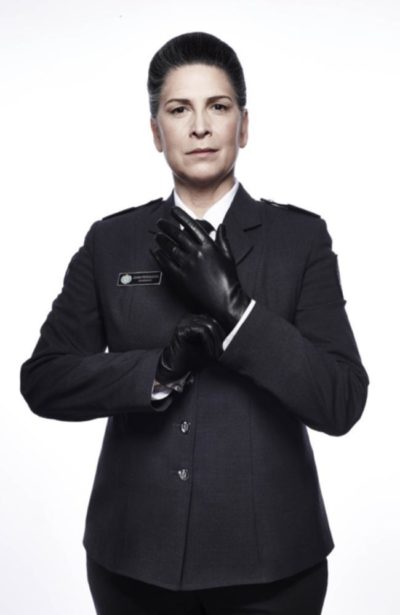 One such was the character mentioned above: Joan Ferguson (Rabe), known as ‘The Freak’ (left). She joined the show as the new governor of Wentworth in season 2, and was, to be blunt, a clinical psychopath, devoid of empathy and incredibly manipulative. She was also very smart, a lethal combination. However, it’s not enough to save her from ending up a prisoner in the jail herself. The first episode of season 5, where Ferguson is released into the general population was, for me, peak Wentworth, and one of the best 45 minutes of television I’ve seen, in any genre.
One such was the character mentioned above: Joan Ferguson (Rabe), known as ‘The Freak’ (left). She joined the show as the new governor of Wentworth in season 2, and was, to be blunt, a clinical psychopath, devoid of empathy and incredibly manipulative. She was also very smart, a lethal combination. However, it’s not enough to save her from ending up a prisoner in the jail herself. The first episode of season 5, where Ferguson is released into the general population was, for me, peak Wentworth, and one of the best 45 minutes of television I’ve seen, in any genre.
Remarkably, she didn’t just survive this reversal of fortune, but thrived. She took over as Top Dog. until an escape plan misfired, ending in her being buried alive by long-serving prison officer Will Jackson (Robbie Magasiva)). But you can’t keep a good villainess down, though it appeared the trauma led to amnesia, with Ferguson subsequently using a different name and with a completely different personality. Was this genuine, or another of her ruses? I couldn’t possibly reveal that. What I will do though, is laud a glorious performance by Rabe, who at six feet tall, has a remarkable physical presence, backed up by ferocious intensity. She’s Cersei Lannister on steroids. And without the incest.
In general, it’s perhaps less exploitative than you might expect, with nudity only when genuinely necessary to the plot, rather than for titillation purposes. On the other hand, the show does not soft-pedal the brutality of prison life, with violence and death a common occurrence. Inmates tend to handle their own infractions internally, the Top Dog having the ability to impose punishments for theft, deceit or, perhaps the worst offense of all, “lagging” i.e. talking to prison authorities. It would definitely be rated a hard R, purely for its authentically no-holds barred language. Boy, do the Aussies love themselves a good c-bomb – even more than us Scots!
There were, admittedly, times where the story-lines seemed to get away from the creators. A few threads did appear to be ended, rather than properly resolved. But considering the 70+ hours of television the show represented, such misfires proved remarkably few. The writers definitely had a talent for juggling multiple plot threads and keeping them all moving forward simultaneously. In the end though, it was the actresses (and actors) who made this show what it was, and which kept us coming back for the best part of a decade. If not our favourite show ever on Netflix, it’s definitely up there with the very best.
Creators: Lara Radulovich and David Hannam
Star: Danielle Cormack, Pamela Rabe, Kate Atkinson, Katrina Milosevic
 For six months or so, our morning routine involved the consumption of an episode of Parks and Recreation with breakfast. Our favourite character on the show was Ron Swanson, but not far behind was April Ludgate, played by Aubrey Plaza. She was the mistress of deadpan misanthropy, delivering lines like “I’m just gonna live under a bridge and ask people riddles before they cross.” We’ve not seen her in much since the show ended, but the concept of April Ludgate, career criminal, was too delicious to pass up. So here we are, yet I must admit, Plaza is almost good enough to make us forget April. Well, except for one roll of the eyes, which was vintage Ludgate.
For six months or so, our morning routine involved the consumption of an episode of Parks and Recreation with breakfast. Our favourite character on the show was Ron Swanson, but not far behind was April Ludgate, played by Aubrey Plaza. She was the mistress of deadpan misanthropy, delivering lines like “I’m just gonna live under a bridge and ask people riddles before they cross.” We’ve not seen her in much since the show ended, but the concept of April Ludgate, career criminal, was too delicious to pass up. So here we are, yet I must admit, Plaza is almost good enough to make us forget April. Well, except for one roll of the eyes, which was vintage Ludgate.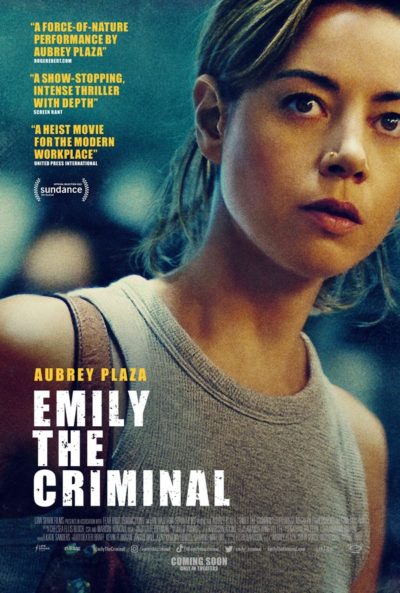 She plays Emily, a young woman saddled with an inescapable pit of student loans, for a basically useless qualification, and an unfortunate felony relegating her to food delivery work. A chance encounter brings her into contact with Youcef (Rossi). She earns $200 for making a fraudulent credit-card transaction on his behalf, and is offered the chance to earn ten times that, for a larger, riskier purchase. With regular employment clearly not the solution, Emily embraces her new, illegal career, working with Youcef, much to the disdain of his Lebanese brothers. As their infighting escalates, Youcef decides to cut and run, only to be beaten to the punch. Emily won’t stand for that: “You’re a bad influence,” says Youcef, as he and Emily prepare to rob his brother. He’s not wrong.
She plays Emily, a young woman saddled with an inescapable pit of student loans, for a basically useless qualification, and an unfortunate felony relegating her to food delivery work. A chance encounter brings her into contact with Youcef (Rossi). She earns $200 for making a fraudulent credit-card transaction on his behalf, and is offered the chance to earn ten times that, for a larger, riskier purchase. With regular employment clearly not the solution, Emily embraces her new, illegal career, working with Youcef, much to the disdain of his Lebanese brothers. As their infighting escalates, Youcef decides to cut and run, only to be beaten to the punch. Emily won’t stand for that: “You’re a bad influence,” says Youcef, as he and Emily prepare to rob his brother. He’s not wrong. 




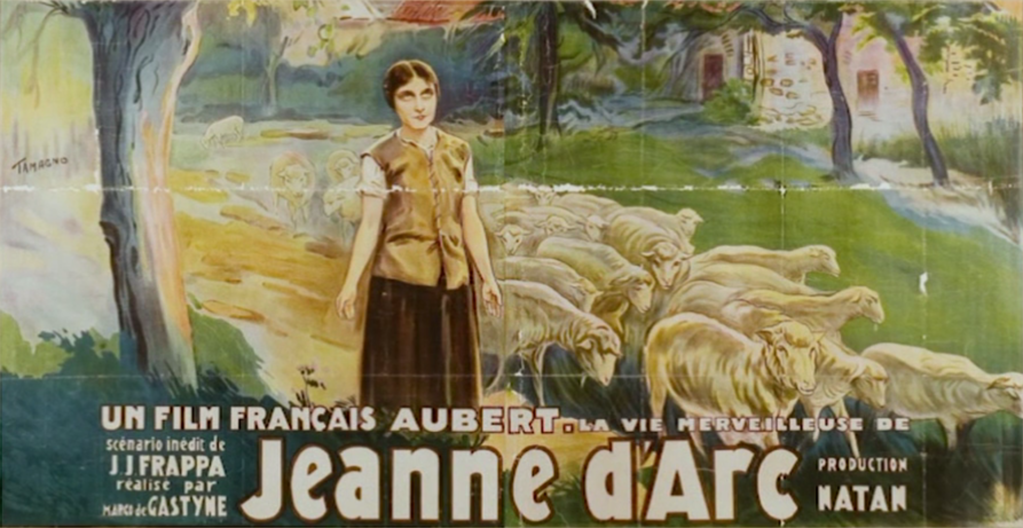 ★★★★
★★★★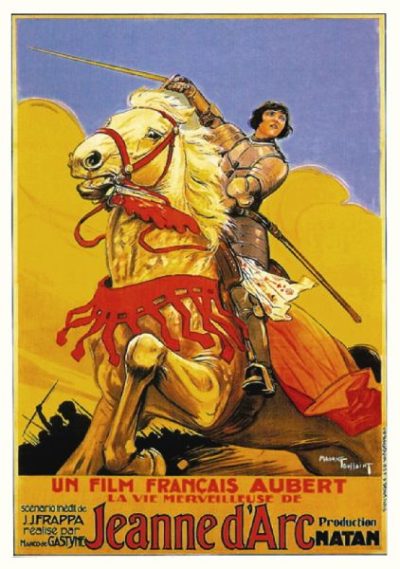 History has largely forgotten this version, in favour of Carl Theodor Dreyer’s La Passion de Jeanne d’Arc. Both movies were produced concurrently, interest in the topic apparently having been spurred by the canonization of Joan at the start of the twenties, and the approaching 500th anniversary of the events in her life. However, delays during filming meant this adaptation was beaten to the cinema by Dreyer’s. It perhaps was also impacted commercially by the arrival of the new-fangled “talkies”, leaving silent movies like this looking old-fashioned. Half a century later, the film was eventually restored, and can be found on YouTube as well as
History has largely forgotten this version, in favour of Carl Theodor Dreyer’s La Passion de Jeanne d’Arc. Both movies were produced concurrently, interest in the topic apparently having been spurred by the canonization of Joan at the start of the twenties, and the approaching 500th anniversary of the events in her life. However, delays during filming meant this adaptation was beaten to the cinema by Dreyer’s. It perhaps was also impacted commercially by the arrival of the new-fangled “talkies”, leaving silent movies like this looking old-fashioned. Half a century later, the film was eventually restored, and can be found on YouTube as well as 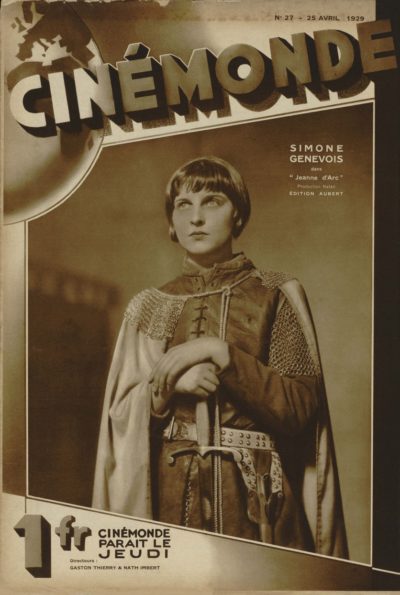 Then there’s the burning at the stake, another scene which came uncomfortably close to historical accuracy for Genevois. “The moment the wood caught fire I yelled ‘It burns!’ [The director] Marco was so sure I was afraid, that he did nothing at all. All of a sudden the cameraman, Gaston Brun, shouted ‘She’s burning!’ and everyone ran towards me, because I was tied up and couldn’t budge. I was very frightened.” Even putting that aside, there’s no denying the emotional wallop it packs, particularly in the extended shot of Joan walking towards her death: Simone’s face, again, sells this in a way which left me genuinely distraught. This doesn’t happen often, and never before while watching any silent movie.
Then there’s the burning at the stake, another scene which came uncomfortably close to historical accuracy for Genevois. “The moment the wood caught fire I yelled ‘It burns!’ [The director] Marco was so sure I was afraid, that he did nothing at all. All of a sudden the cameraman, Gaston Brun, shouted ‘She’s burning!’ and everyone ran towards me, because I was tied up and couldn’t budge. I was very frightened.” Even putting that aside, there’s no denying the emotional wallop it packs, particularly in the extended shot of Joan walking towards her death: Simone’s face, again, sells this in a way which left me genuinely distraught. This doesn’t happen often, and never before while watching any silent movie. The journey up is where the moist hands started. I don’t care how nice the views might be, I’m afraid it’s going to be a no from me, dawg. Adding to the fraught tension, is the focus by Mann on the decaying structure: rust, missing bolts and general creakiness. It’s like Final Destination: you know something is inevitably going to go terribly wrong, it’s just a question of when, and the specifics. It duly does, leaving the pair stranded near the top, on a platform about the size of our dining table, with no route down or way to call for help. The rest of the film is the struggle of Becky and Hunter (she uses her last name, or her social media identity of “Danger Deb”) to find a way to do one or the other.
The journey up is where the moist hands started. I don’t care how nice the views might be, I’m afraid it’s going to be a no from me, dawg. Adding to the fraught tension, is the focus by Mann on the decaying structure: rust, missing bolts and general creakiness. It’s like Final Destination: you know something is inevitably going to go terribly wrong, it’s just a question of when, and the specifics. It duly does, leaving the pair stranded near the top, on a platform about the size of our dining table, with no route down or way to call for help. The rest of the film is the struggle of Becky and Hunter (she uses her last name, or her social media identity of “Danger Deb”) to find a way to do one or the other.  ★★★★
★★★★ This reaches its height in a glorious, extended sequence, with the Princess battling her way down the tower’s staircase. It feels as if it’s 20 minutes long, such is the energy contained in it. There’s even a beautiful moment of tension releasing humour, part of a running gag involving one of Julian’s minions who is too fat for all the stairs he’s ordered to climb. Nothing thereafter, including the inevitable fight against her wannabe husband, quite reaches the same heights. Glover is good value as Julian, staying just this side of a pantomime villain. As Die Hard shows, having a memorable antagonist is an important element. He’s not quite Alan Rickman – though who is? And I do have to question some of Julian’s decisions.
This reaches its height in a glorious, extended sequence, with the Princess battling her way down the tower’s staircase. It feels as if it’s 20 minutes long, such is the energy contained in it. There’s even a beautiful moment of tension releasing humour, part of a running gag involving one of Julian’s minions who is too fat for all the stairs he’s ordered to climb. Nothing thereafter, including the inevitable fight against her wannabe husband, quite reaches the same heights. Glover is good value as Julian, staying just this side of a pantomime villain. As Die Hard shows, having a memorable antagonist is an important element. He’s not quite Alan Rickman – though who is? And I do have to question some of Julian’s decisions. 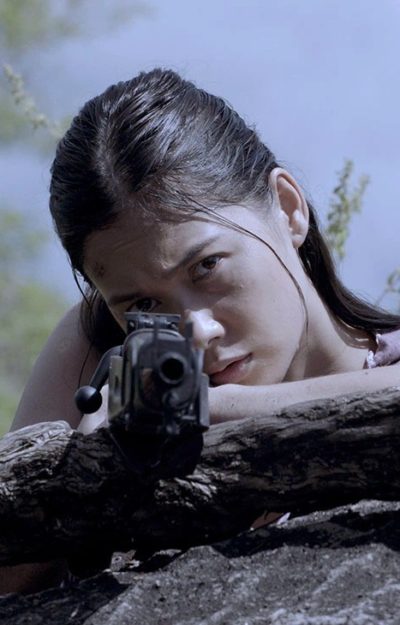
 The heroine here, Mariano (Salvador), has to count as the baddest bitch I’ve seen in quite a long time. In terms of being a sheer, unstoppable force, she’s right up there with Jen from
The heroine here, Mariano (Salvador), has to count as the baddest bitch I’ve seen in quite a long time. In terms of being a sheer, unstoppable force, she’s right up there with Jen from  This was a very pleasant surprise. I wasn’t expecting much from this, especially after seeing Wynorski’s name – let’s be honest, he is best known for bargain basement soft-port. That said, he does occasionally hit one out of the park, such as the sublime Deathstalker II. This is definitely one of his better entries, even if it is, by and large, a low-budget version of Assault on Precinct 13.
This was a very pleasant surprise. I wasn’t expecting much from this, especially after seeing Wynorski’s name – let’s be honest, he is best known for bargain basement soft-port. That said, he does occasionally hit one out of the park, such as the sublime Deathstalker II. This is definitely one of his better entries, even if it is, by and large, a low-budget version of Assault on Precinct 13. ★★★★
★★★★ It spawned local remakes in a number of countries. The Dutch was the most successful, running for four seasons, but Belgium, Germany and Turkey also took the show and recreated it. [Here is as good a place as any to mention that back in 1982, there was a male spin-off of the original show called Punishment. Though it lasted only one season, the cast included some guy called Mel Gibson…] Indeed, the Turkish one, known on Netflix as The Yard, was
It spawned local remakes in a number of countries. The Dutch was the most successful, running for four seasons, but Belgium, Germany and Turkey also took the show and recreated it. [Here is as good a place as any to mention that back in 1982, there was a male spin-off of the original show called Punishment. Though it lasted only one season, the cast included some guy called Mel Gibson…] Indeed, the Turkish one, known on Netflix as The Yard, was  One such was the character mentioned above: Joan Ferguson (Rabe), known as ‘The Freak’ (left). She joined the show as the new governor of Wentworth in season 2, and was, to be blunt, a clinical psychopath, devoid of empathy and incredibly manipulative. She was also very smart, a lethal combination. However, it’s not enough to save her from ending up a prisoner in the jail herself. The first episode of season 5, where Ferguson is released into the general population was, for me, peak Wentworth, and one of the best 45 minutes of television I’ve seen, in any genre.
One such was the character mentioned above: Joan Ferguson (Rabe), known as ‘The Freak’ (left). She joined the show as the new governor of Wentworth in season 2, and was, to be blunt, a clinical psychopath, devoid of empathy and incredibly manipulative. She was also very smart, a lethal combination. However, it’s not enough to save her from ending up a prisoner in the jail herself. The first episode of season 5, where Ferguson is released into the general population was, for me, peak Wentworth, and one of the best 45 minutes of television I’ve seen, in any genre.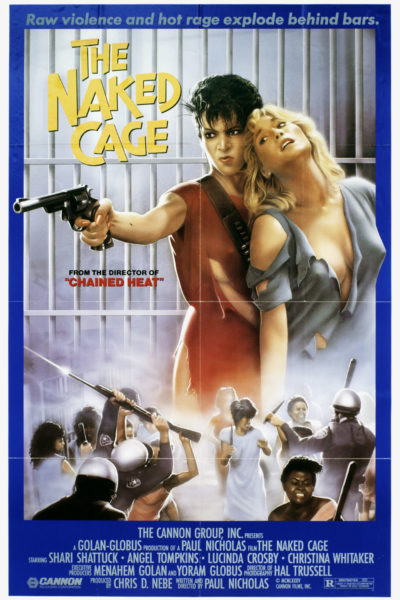
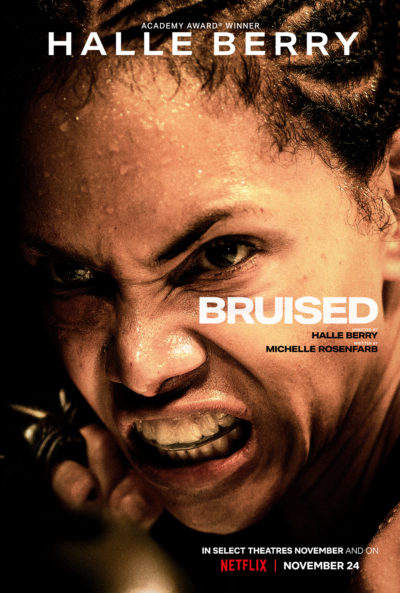 Halle Berry was born the same year I was. There is, however, just one of us that is capable of convincingly playing the role of a mixed martial artist. To give you another yardstick, the lead in this was originally going to go to Mrs. Ryan Reynolds, Blake Lively (
Halle Berry was born the same year I was. There is, however, just one of us that is capable of convincingly playing the role of a mixed martial artist. To give you another yardstick, the lead in this was originally going to go to Mrs. Ryan Reynolds, Blake Lively (